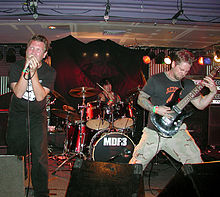조 그카비
Joe Gqabi조 그카비 | |
|---|---|
| 태어난 | 조 은징고 그카비 )1929년 4월 6일 |
| 죽은 | 1982년 7월 31일(53) |
| 휴게소 | 알리왈 노스 |
| 정당 | 아프리카 민족 회의 |
조 은징고 그카비(1929년[1] 4월 6일 ~ 1981년 7월 31일)[2]는 남아프리카 공화국 의회 운동가로, 1981년 하라레 애쉬다운 공원에서 남아공 국방군에 의해 암살당했을 당시 짐바브웨에서 ANC의 수석 대표였다.[3][4]
초년기
Gqabi는 현재 Joe Gqabi District 시로 알려진 알리왈 노스(Aliwal North)에서 1929년에 태어났다.[5][6] 그의 모국어는 호사어였다.
정치 활동
1950년대에 Gqabi는 뉴에이지의 기자였으며,[7] 그 기간 동안 그는 Walter Sisulu와 자주 접촉했다.[8] 남아공 공산당과 UMkhonto we Sizwe는 1960년대 초 중국에서 게릴라 훈련을 받기 위해 파견되었다.[9] 로데시아에서 군사훈련을 받고 있던 동료 대원 28명과 함께 붙잡혀 남아프리카로 강제 추방됐고, 그곳에서 불법 출국한 혐의로 2년형을 선고받고 사보타주법에 따른 범죄로 10년형을 선고받은 뒤 로벤 섬에 수감됐다.[10]
그는 1975년 감옥에서 풀려난 후 ANC에 다시 가입했다.[11] 1976년 그는 메인 기계로 알려진 요하네스버그에 있는 비밀 ANC 조직의 마틴 라모크가디와 함께 공동 의장이 되었다.[12] 이 기간 동안 남아공 보안국은 그의 차에 폭탄을 설치해 암살을 시도했으나, 폭발하기도 전에 발각되었다.[10] 그는 소웨토 항쟁 이후 다시 체포되었지만, 경찰은 거의 증거도 없이 그를 상대로 소송을 제기할 수 없었다.[10] 1977년 석방되어 보츠와나로 떠났다가 독립 후 짐바브웨로 갔다.[10]
죽음
1981년 7월 31일 짐바브웨 하라레 애쉬다운 공원에서 남아프리카 공화국 방위군에 의해 암살당했다. 그의 시신은 2004년 남아프리카로 송환되었고 2004년 12월 16일 알리왈 노스(Aliwal North)에서 재유출되었다.[10]
명예
그는 남아프리카 정부로부터 은으로 루툴리 훈장을 추서받았다. Joe Gqabi District 자치구가 그의 명예로 명명되었다.[10]
참조
- ^ "South African History Online".
- ^ "The arms cache at Ascot Farm". The Standard. Zimbabwe. 25 July 2016.
- ^ Badat, Saleem (2013). The Forgotten People: Political Banishment under Apartheid. BRILL. p. 24. ISBN 9789004247710.
- ^ Todd, Judith Garfield (2007). Through the Darkness: A Life in Zimbabwe. Zebra Press. p. 209. ISBN 9781770220027.
- ^ "Name Change". Joe Gqabi District Municipality.
The name of Ukhahlamba District Municipality changed on the 1st of February 2010 to Joe Gqabi District Municipality.
[영구적 데드링크] - ^ T. L. Marawu (Executive Mayor) (25 February 2010). "State of the District Address — Joe Gqabi DM" (PDF). Joe Gqabi District Municipality. Retrieved 5 October 2012.
Our people must be aware that we are changing the name of this municipality to Joe Gqabi District Municipality This takes place after the public consultation we have made in this regard. The public chose the name Joe Gqabi to honour the role played by this hero in fighting against apartheid.
[영구적 데드링크] - ^ "Joe Nzingo Gqabi". South African History Online. Retrieved 5 October 2012.
- ^ Sisulu, Elinor (2011). Walter & Albertina Sisulu: In Our Lifetime. New Africa Books. p. 398. ISBN 9780864866394.
- ^ Barrell, Howard (1992). "The Turn to the Masses: The African National Congress' Strategic Review of 1978-79" (PDF). Journal of Southern African Studies. 18 (1): 64–92. doi:10.1080/03057079208708306. JSTOR 2637182.
- ^ a b c d e f "Joe Nzingo Gqabi (1928 - 1981)". The Presidency. Republic of South Africa. Retrieved 29 April 2019.
- ^ Simpson, Thula (2011). "Military Combat Work: the Reconstitution of the ANC's Armed Underground, 1971–1976" (PDF). African Studies. 70 (1): 103–122. doi:10.1080/00020184.2011.557579. hdl:2263/17443.
- ^ Simpson, Thula (2011). "Main Machinery: The ANC's Armed Underground in Johannesburg During the 1976 Soweto Uprising". African Studies. 70 (3): 415–436. doi:10.1080/00020184.2011.628801.

